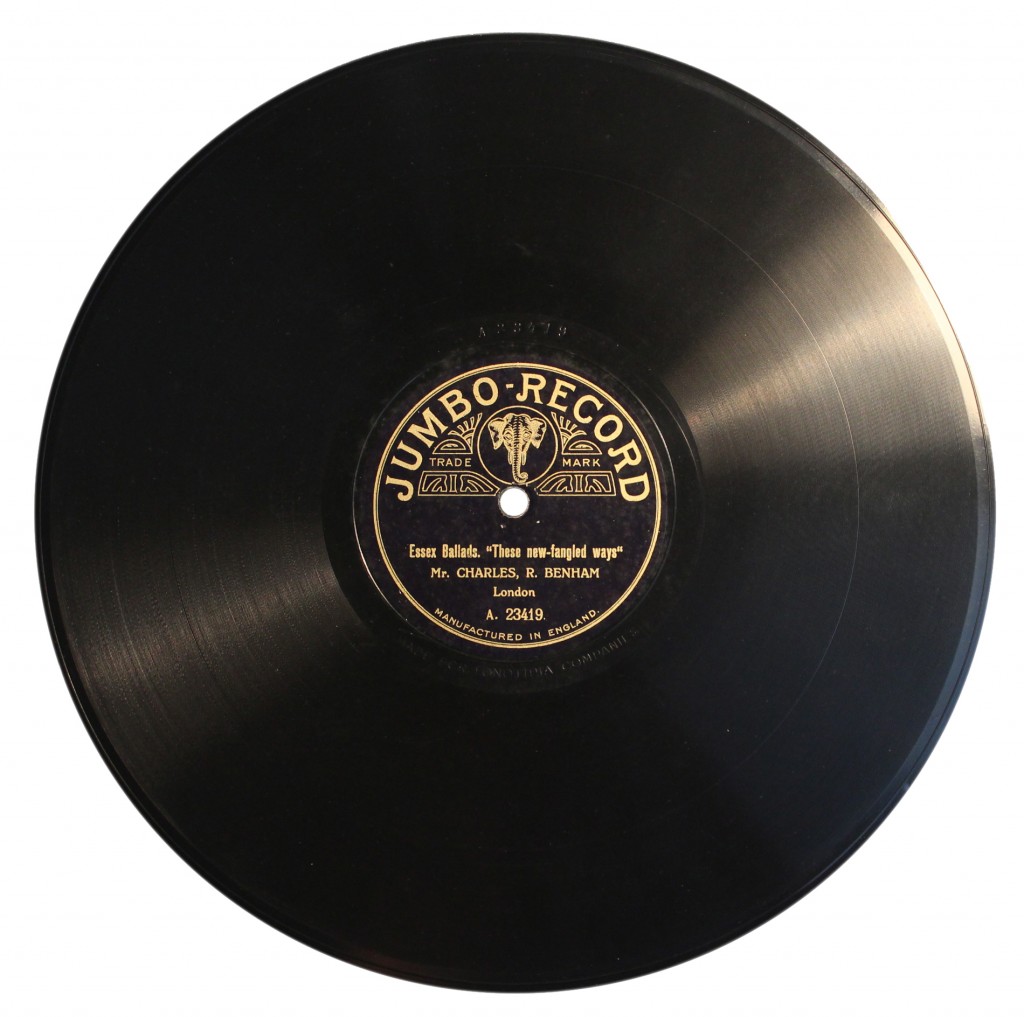Our Sound Archivist Martin Astell begins a series for us of monthly highlights from the Essex Sound and Video Archive…
“These New-Fangled Ways” (A Ballad of Protest), SA 24/222/1
To begin this series and to be our first ‘Recording of the Month’ I have chosen one of the oldest recordings held in the Essex Sound and Video Archive. The exact date the recording was made is not known, but it is thought to be around 1905 or 1906. It is taken from one side of a double-sided 78rpm shellac disc on the “Jumbo” label, and consists of a poem written, and in this case spoken, by Charles E. Benham.
The poem is subtitled A Ballad of Protest as it satirises the curmudgeonly views of an old country fellow who cannot see the benefits of change and such modern contrivances as parish councils and board schools. Although it relates particularly to the late nineteenth century – which was, indeed, a time of great change – nevertheless, the theme can be seen as more or less universal, reminding us that we all may have a tendency to regard new developments as dangerous, retrograde or, at the very least, unnecessary.
Charles E. Benham published his Essex Ballads and Other Poems in 1895. He took a keen interest in the Essex dialect and the thirteen Essex ballads were written in this manner ‘to perpetuate many archaic and interesting forms of folk speech.’ It was later that he was asked to make sound recordings of a number of these poems, as he explains in the Transactions of the Yorkshire Dialect Society (Part XIX, Volume III, December 1917, p.22):
“Some time before the war a student from Berlin named Theodor Albrecht, came to me in order that I should correct his vocal interpretation of my Essex Ballads. Friends warned me to have nothing to do with him, as even then it was suspected that he was trying to acquire the east coast dialect for sinister purposes. Be that as it may, the country was not endangered by his visit, for the accent with which he solemnly read the book was such that he never could have made himself understood in Essex, much less have passed himself off as a native. However, he appeared satisfied, and he wrote and published an extensive thesis or “inaugural dissertation” on the Essex Ballads which gained him the degree of Doctor at the University, and the University itself commissioned me to have phonograph records made of four of the ballads to be deposited in Berlin.”
You may have to listen to the recording a few times before you are able to discern every word but if you want to cheat, the poem is transcribed on its SoundCloud page. However, you may notice that the author recites some of the verses in a slightly different order than in the published version. And by the way, the word ‘tares’ which appears in the poem is given as “rough grass, weeds” in Edward Gepp’s A Contribution to an Essex Dialect Dictionary (London, 1920) but is defined in James Britten’s Old Country and Farming Words: Gleaned from Agricultural Books (London, 1880) rather more specifically as Vicia Sativa, or the common vetch, which is grown as livestock fodder or as a soil-fertilising plant.
Many more examples of Essex dialect and accents can be heard in recordings held in the Essex Sound and Video Archive, and the ERO library contains dialect dictionaries, plays and novels written in dialect, and numerous papers discussing the subject (particularly in the Essex Review). The Essex Sound and Video Archive has a source list (ESVA Sources on dialect) which will help you to identify some good examples of recordings, or you could purchase a copy of our CD called How to Speak Essex: 20th Century Voices from the Essex Sound and Video Archive; please e-mail ero.enquiry@essex.gov.uk or telephone 01245 244644 for more information.
Written examples of dialect speech are a valuable resource for the academic, but nothing can be better than hearing the real thing. As Charles Benham says:
“But to preserve for future generations the distinctive intonation, accent, and inflection, there is still needed the gramophone record, and this important aid should not be overlooked by the devout dialect-philologist.”
(‘The Essex Dialect’ by Charles E. Benham, The Essex Review, Volume XXIX, 1920, p.159)
And perhaps he should have added that there is still needed an accessible sound archive in which these treasures can be preserved, and that should not be overlooked either.

